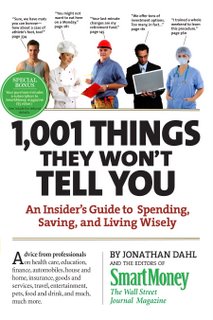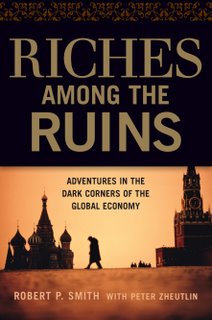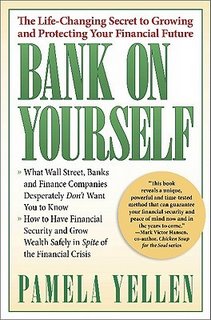So, if I'm not reading (finishing) many books, not watching TV, have cut back on my movie habit and haven't mowed my lawn in days (weeks? Sorry, neighbors), what could I possibly be doing with my time?
One word: Facebook. Aka the time-suck where I run into old pals and stay up into the wee hours.
It's also the time of year: I can stay out later neglecting my lawn and not buying the tomato plants I need to buy.
Below are three new business books the AP has taken the time to capsulize. I guess the "personal finance team" is not too busy friending their former elementary school best friends to review some books... (P.S. You are looking at The Mercury's "personal finance team.")
Bookshelf: Things they won't tell you
The AP Personal Finance Team
"It all sounds good, but what aren't they telling me?" As a consumer that's a question you might ask about your plumber, auto mechanic or any other service-provider. If you're intrigued, that's the concept behind the new compilation of SmartMoney's collection of its regular "10 Things They Won't Tell You" feature.
While investors with a bit of an appetite for risk may want to learn more about emerging markets in Riches Among the Ruins. These are just a few of new personal finance titles that might help you sort out your money questions.
_____________________
TITLE: 1,001 Things They Won't Tell You: An Insider's Guide to Spending, Saving, and Living Wisely
AUTHOR: Jonathan Dahl and the editors of SmartMoney, The Wall Street Journal magazine
PUBLISHER: Workman Publishing
PRICE: $16.95 (paperback)
SUMMARY: If you're a fan of lists, you're in for a treat. This book compiles 100 updated installments of SmartMoney's popular monthly feature, "10 Things They Won't Tell You" into more than 500 pages.

The lists are intended to give readers an insider look into a variety of topics, such as using ticket brokers and going to the eye doctor. The book is divided into chapters such as family, education, home, food and drink, and health.
The lists often impart interesting research and are written in a playful tone that make them fun to flip through, if not carefully study. Under "Alternative Healers," for instance, categories include, "I'm not a doctor but I play one in my office" and "Hypochondriacs are my specialty."
Topics aren't always obviously related to personal finance, such as the lists on campus security and yoga instructors. But the implications for the consumer are always kept in mind. As Dahl writes in the introduction, "Who doesn't love a list?"
QUOTE: "It's what you aren't told by the experts that is almost as important as what they do say."
__________
TITLE: Riches Among the Ruins: Adventures in the Dark Corners of the Global Economy
AUTHOR: Robert P. Smith
PUBLISHER: AMACOM

PRICE: $24.95 (hardcover)
SUMMARY: If you think playing the markets in the U.S. isn't for the faint of heart, try trading in the debt of emerging market governments. Fortunes can be made or lost on an overnight currency fluctuation, corruption, or an outbreak of disease — think Mexico and swine flu.
Robert P. Smith is an American who has made and lost tens of millions of dollars trading debt in downtrodden economies. He started in the late 1970s, when such deals were virtually nonexistent. In "Riches Among the Ruins," Smith recounts adventures such as ducking shakedown artists in Nigeria, and racing through the streets of Baghdad after the fall of Saddam Hussein. In post-communist Russia, he lost more than $15 million in a single day when the ruble collapsed.
Beyond the war stories, Smith offers lessons relevant for U.S. investors seeking opportunity overseas. Smith also shares his take on the importance of narrowing the gap between rich and poor; the U.S. role in the global economy; and an increasingly integrated world trade system.
QUOTE: "At the end of the day, a country has to rescue itself, because outside sources — the IMF, the World Bank, investment banks, and other nations — often have secondary motives that may not align with the country's national interest."
__________
TITLE: Bank on Yourself
AUTHOR: Pamela Yellen

PUBLISHER: Vanguard Press
PRICE: $25.95 (hardcover)
SUMMARY: Former financial consultant Pamela Yellen maintains that you can't rely on mutual funds, stocks or real estate to provide long-term financial security. She says you can buy cars, fund your child's college, take vacations and make major purchases by using her "Spend and Grow Wealthy" program, which she promises will also enable you to fund your retirement nest egg.
Her secret is a dividend-paying whole life insurance policy offered by a handful of companies, plus a "paid up additions rider." After paying premiums for a few years, the policy is used to fund loans to yourself. You then pay back those loans, with the interest you would have paid to banks or credit card companies, helping to build up your reserves.
The book is filled with anecdotes and personal stories of people who have used the plan. But there are few worksheets or specific details on exactly how it works, and Yellen warns readers that discussing the plan with most finance or insurance professionals will yield criticisms of her advice, because they are not trained in the specialized program. Throughout the book there are references to the related Web site, www.bankonyourself.com, which is where readers are directed to go for a referral to a "Bank on Yourself Certified Advisor."
QUOTE: "Your retirement plan investments are typically subject to market risk and volatility. However, your principal in a B.O.Y. plan won't vanish due to a stock or real estate market correction. And your growth, as soon as it's credited to your plan, is locked in."
No comments:
Post a Comment